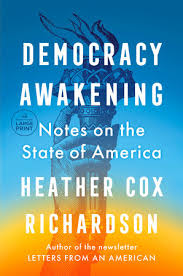Heather Cox Richardson is an outstanding historian. I first became aware of her work on the Civil War and Reconstruction years ago. Her scholarship is rigorous, her prose clear and compelling. If you were teaching a course on American history in the latter part of the nineteenth century, you would assign her books – and students would read them. She is that good.
In the past decade plus, Richardson’s work has moved into the public sphere as she engaged with broader issues. Richardson has a daily substack newsletter with many followers, a podcast series, and is balancing her traditional scholarship with a nuanced look at contemporary affairs. She describes herself as a “Lincoln Republican.” What makes so much of her writing engaging is her rigor. Richardson finds ways to build themes from facts, not assertions, and she respects consistency and detail.
In 2023, Richardson wrote Democracy Awakening: Notes on the State of America. It is a big-picture book, a work of American history that contrasts two themes: authoritarianism and democracy, over the centuries. Richardson moves quickly and selectively in the book, framing events in support of her larger argument. It is not a work of discovery, but rather one of explication. Democracy Awakening is history done tidy, with little time for the complexities and contradictions that render her other works so fascinating. Accordingly, I found it to be an unusual book, one that has me wondering about what history can – and cannot – and what sticks in the public’s mind.
Democracy Awakening is strongest, and most effective, in reminding readers that authoritarian tendencies are deeply woven into American political life. Moreover, these impulses have been vibrant and essential to the creation of the United States. Much of our history is one of conflict, which demands cohesion. Richardson, accordingly, is quite good at identifying the persistence of this strand. We tend to miss these, often assuming that the contingencies that have made today possible were rife with meaning. Some are and some are not.
On the other hand, America’s equally ambitious democratic impulse is a national aspiration. This matters a great deal and it is where Richardson’s values align. She notes, as we all have to when looking at facts, that the march towards democratic rights for all has not taken place in a straight line. The journey has been complicated and remains so today. What that means for history is that it is difficult to align historical figures, movements and events, into clear and consistent categories. The strength and importance of history, in other words, comes from the close analysis of how, when and why we can make supported claims for where and how we track and make sense of those changes.
Richardson does this and does it well. In Democracy Awakening, though, she gives more of her attention to the theme than perhaps in some of her other books. That left this reader wanting more complexity and contradiction. For it is in wrestling with these problems that Richardson’s skill truly shines.
David Potash

